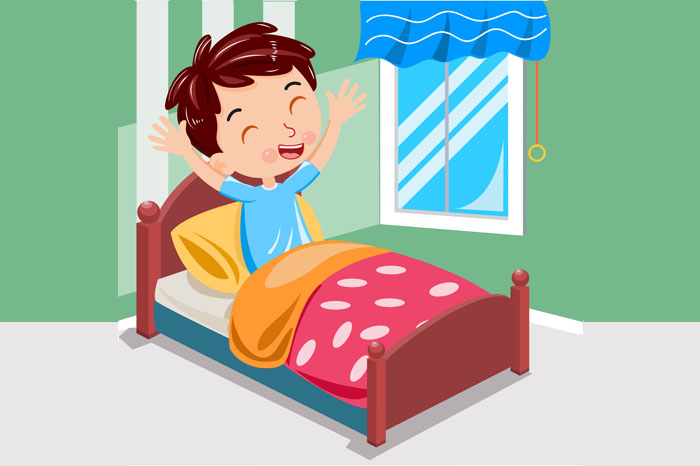Bedwetting is a common problem for many toddlers and children. It is something that everyone goes through. Though a common occurrence, it is often both frustrating and embarrassing for both the child as well as the parent. So the big question is how to stop bedwetting? Is it possible?
The answer is YES! It can be. There are a variety of solutions that can help to stop bed-wetting and make the transition to dry nights smoother. Like other aspects of parenting, this too requires a lot of love and patience.
Here are eight solutions on how to stop bed wetting in toddlers and children:
- No Punishing Rule: Scolding or punishing the child is not an effective solution to stop bedwetting. Children do not like being shouted at. They feel ashamed, and get anxious. What’s worse? They could go into a shell. So, parents should approach the issue with patience and understanding. Encouragement and positive reinforcement can help the child overcome bedwetting. Regular bathroom trips before bed and reducing fluid intake before bedtime can also help prevent bedwetting. Remember, bedwetting is a normal stage of development and it will eventually pass.
- Encourage frequent bathroom breaks and Limit fluid before bedtime: Encouraging frequent bathroom breaks can help prevent bedwetting in toddlers. This is because when a child holds in their urine for too long, their bladder can become overly full, causing accidents. Ensure that the child uses the bathroom every two hours during the day and before bed.
Another thing to do is to limit the amount of fluid your toddler drinks before bedtime. This will help in reducing the pressure on the bladder and decrease the likelihood of bedwetting. It is important to note that this does not mean completely depriving them of fluids, just be mindful of the amount they are drinking close to bedtime.
Also Read – Toddler not peeing but drinking
- Use a bed-wetting alarm: Do you want a simple solution? A bedwetting alarm is one! It is a tried and tested solution to stop bedwetting in toddlers. The alarm is placed on the child’s underwear and sounds an alarm when it detects moisture. This wakes up the child, allowing them to use the bathroom and preventing further bedwetting. Over time, children will learn to associate the full bladder with the need to go to the bathroom and will stop bedwetting on their own. Bed-wetting alarms are safe and do not cause any harm to the child. With consistent use, they can effectively end bedwetting in just a few weeks.
- Fun Incentive Charts: Incentive charts can be an effective tool to stop bedwetting in toddlers. Parents can create a chart where the child can track their progress and earn rewards for dry nights. This helps to increase the child’s motivation to stay dry. It’s important to choose rewards that are meaningful to the child and to be consistent with the chart’s use.
- Promote relaxation: One of the best bedwetting solutions is to promote relaxation by creating a calm bedtime routine. One could read a story, give the child a warm bath or help the child with some deep breathing exercises. Encouraging the child to visualize a peaceful place before going to bed can also help them feel more relaxed. Additionally, removing any distractions such as toys or screens from the bedtime environment can help create a peaceful atmosphere. Parents should also be patient and avoid scolding or punishing the child for bedwetting. These methods will help toddlers be better able to control their bladder and reduce the chances of bedwetting.
- Use bed-wetting protection: with the help of bed-wetting protection, this problem can be effectively managed. Bed-wetting protection includes waterproof sheets, underpads, and alarm systems. These products provide a barrier against wetness and help minimize the amount of time and energy spent on cleaning up. Additionally, alarm systems can help train the child to recognize when they are about to wet the bed and wake up before it happens. With the right protection in place, toddlers can overcome bedwetting and gain the confidence to sleep through the night.
- Encourage positive self-talk: Encouraging positive self-talk can help stop bedwetting in toddlers. Parents can help their children by encouraging them to talk positively to themselves about their progress. Statements such as “I am getting better at staying dry at night” can boost their confidence and help them to overcome the issue. Children who are encouraged by their near ones to focus on their successes are more likely to stay motivated and overcome challenges.
Parents should get the children to believe that bedwetting is a common occurrence and that they are proud of their progress. Positive self-talk will not only help cure bedwetting but will also help the child develop a healthy sense of self-worth thereby overcoming bedwetting for good.
- Seek medical help: Bedwetting in toddlers can be a frustrating and stressful situation for parents. It is important to seek medical help to address the issue. Agreed that bedwetting is a common occurrence, but it can also be a sign of underlying health conditions such as urinary tract infection or constipation. Seeking medical help can also rule out these potential causes and provide a customized treatment plan for your child to cure bedwetting. Your doctor can also provide tips on bedwetting prevention, such as limiting liquids before bedtime, using bedwetting alarms, or providing medication if needed. It is about a child’s physical well-being. Do not hesitate to seek medical help!
Stopping bedwetting in toddlers is a gradual process that requires patience and persistence. While it may be difficult to end this habit, there are effective bedwetting solutions to help your child. Encouraging positive behaviour, avoiding harsh punishments, and staying patient is key to curing bedwetting. While searching for a preschool for your child, do look for centres that are sympathetic to kids who are dealing with bedwetting and have provisions for them. Preschools like EuroKids have trained staff to take care of such accidents and offer bedwetting solutions to the child in the most gentle way.
Parents, it is absolutely normal for children to wet the bed. Please do not take it as a reflection of their ability to control their bladder. With time and support, your child will be able to overcome this common developmental stage and achieve dry nights.
















